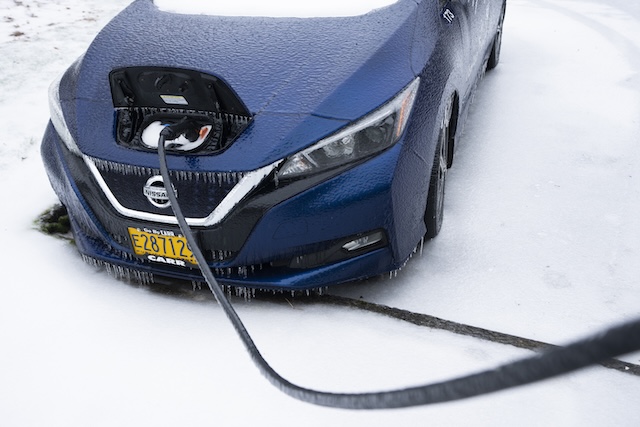Editorial: Oregon’s gas tax is out of gas
Published 9:27 am Thursday, July 24, 2025

- Icicles hang from an electric vehicle that is parked at a charging station in Tigard. Electric vehicles don't work well with a gas tax. (AP Photo/Jenny Kane)
When Gov. Tina Kotek spoke with the reporters Wednesday morning, it sounded like the Oregon government may start moving away from a gas tax to fund transportation.
The gas tax isn’t disappearing any time soon. It’s logical replacement, a road user charge where people pay by the miles they drive, may be coming soon to some vehicles near you. And it’s going to be mandatory.
Kotek called the Legislature back in for a special session on Aug. 29 to pay for operations and maintenance at the Oregon Department of Transportation. The tax is also for money for other things, such as transit districts and local government transportation needs. Legislators didn’t reach agreement on what that should look like before adjourning this year. That may lead to hundreds of layoffs at ODOT and a commensurate reduction in snow plowing, striping, pothole filling and more.
Trending
Kotek believes she has the votes to pass a transportation package that would include:
- A gas tax increase of 6 cents a gallon.
- An increase in some registration and title fees, such as additional charge on car registrations.
- An increase in the payroll tax for transit from .1% to .2%.
- An increased level of transparency requirements for ODOT, including a regular performance audit.
Tolling will be another part of the package — or rather a lack of tolling. The prospect of tolling has been a sore spot for many residents and legislators. Kotek paused tolling. She said the package for the special session will include a provision to strip out a requirement in Oregon law for mandatory tolling, such as on Interstate 5.
The funding increases that Kotek listed are the old way Oregon has paid for roads. But with electric vehicles and high-mileage vehicles, a gas tax is going to run out of gas. A road user charge should be the future.
Oregon has a voluntary system now, OReGO. Drivers pay two cents per mile driven. We can’t say nobody has joined it. It’s been in place since 2015. The number of participants is in the hundreds. It’s got to be more attractive or mandatory for people to join.
If you have signed up, it might be very useful to others if you would write a letter to the editor or a longer column describing your experience.
Kotek’s talking points for Wednesday’s news conference included the following about a mandatory road user charge: “There is bipartisan interest in getting started on mandatory RUC; it will be necessary for future funding and financial sustainability. We need to get started. It would begin on the following dates for the following types of vehicles: 7/1/27: Existing EVs; 1/1/28: New EVs; 7/1/28: Hybrids/plug-in hybrids.”
Trending
We don’t savor the invasive aspect of a road user charge. Somebody, somewhere will have information about how far a vehicle goes. There are privacy protections in place. But there will be opportunities for mistakes or misuse of data, if it exists.
A road user charge could ensure electric vehicles and hybrids pay an appropriate share for their use of the roads. It depends on how the rate per mile is set. Their participation will ensure the system is running smoothly when the rest are directed into that lane.







